人教版高中英语选修-计算机英语:Stand-alone Utility Programs_课件1
人教版高中英语词汇3500词(必背)带音标

高中英语词汇3500词Aabandon[əˈbændən] v.抛弃,舍弃,放弃ability[əˈbɪlɪtɪ] n. 能力;才能able [ˈeɪb(ə)l] a. 能够;有能力的abnormal [æbˈnɔːm(ə)l] a. 反常的,变态的aboard[əˈbɔːd] prep. 上(船,飞机,火车,汽车等)abolish[əˈbɔlɪʃ] v. 废除,废止abortion[əˈbɔːʃ(ə)n] v. 人工流产,堕胎about[əˈbaʊt] ad. 大约;到处;四处prep. 关于;在各处;四处above [əˈbʌv] prep. 在……上面a. 上面的ad. 在……之上abroad[əˈbrɔːd] ad. 到(在)国外abrupt[əˈbrʌpt] a. 突然的,意外的,粗鲁absence[ˈæbsəns] n. 不在,缺席absent [ˈæbsənt] a. 缺席,不在absolute [ˈæbsəluːt] a. 完全,全部,绝对的absorb [əbˈsɔːb] v. 吸收,使全神贯注abstract [ˈæbstrækt] a./ n. 抽象的(作品)absurd [əbˈsɜːd] a.荒谬的,怪诞不经的abundant [əˈbʌndənt] a.大量,丰盛的,充裕的abuse [əˈbjuːz] v.(酗酒)滥用,虐待,恶语academic [ækəˈdemɪk] a. / n. 学术的,教学的academy [əˈkædəmɪ] n.专科学院,(美)私立学校accelerate [əkˈseləreɪt] v.(使)加速,加快accent [ˈæksənt] n. 口音,音调accept [əkˈsept] vt. 接受access [ˈækses] n. / v. 通道,入径,存取(计算机文件)accessible [əkˈsesɪb(ə)l] a. 可到达的,可接受的,易相处的)accident[ˈæksɪdənt] n. 事故,意外的事accommodation[əkɔməˈdeɪʃ(ə)n] n.住宿,膳宿accompany[əˈkʌmpənɪ] v. 陪同,陪伴,与…同时发生accomplish[əˈkʌmplɪʃ] v. 完成according to[əˈkɔːdɪŋ tʊ] ad. 按照,根据account[əˈkaʊnt] n. 账目;描述accountant[əˈkaʊnt(ə)nt] n. 会计,会计师accumulate [əˈkjuːmjʊleɪt] v. 积累,积聚accuracy [ˈækjʊrəsɪ] n. 准确,精确accuse[əˈkjuːz] v. 正确无误的,精确的accustomed[əˈkʌstəmd] a. 习惯于,惯常的ache[eɪk] vi.& n. 痛,疼痛achieve[əˈtʃiːv] vt. 达到,取得achievement[əˈtʃiːvmənt] n. 成就,成绩,功绩acid[ˈæsɪd] a. 酸的acknowledge [əkˈnɔlɪdʒ] v. 承认acquaintance[əˈkweɪntəns] n. 熟人,(与某人)认识acquire[əˈkwaɪə(r)] v. 获得,得到acquisition[ækwɪˈzɪʃ(ə)n] n. 获得,得到acre[ˈeɪkə(r)] n. 英亩across[əˈkrɔs] prep. 横过,穿过act[ækt] n. 法令,条例v. (戏)表演,扮演(角色),演出(戏);行动,做事action[ˈækʃ(ə)n] n. 行动active[ˈæktɪv] a. 积极的,主动的activity[ækˈtɪvɪtɪ] n. 活动actor[ˈæktə(r)] n. 男演员actress[ˈæktrɪs] n. 女演员actual[ˈæktʃʊəl] a. 实际的;现实的acute a.十分严重的,(病)急性的AD n. 公元ad[æd] (缩) =advertisement n.广告adapt[əˈdæpt] v. 使适应,适合,改编adaptation[ədæpˈteɪʃ(ə)n] n. 适应,改编本add[æd] vt.添加,增加addicted[əˈdɪktɪd] a. 上瘾,成瘾,入迷addition[əˈdɪʃ(ə)n] n.增加;(算数用语)加address[əˈdres] n. 地址adequate[ˈædɪkwət] a. 合适的,合乎需要的adjust[əˈdʒʌst] v.调整,调节,适应,习惯adjustment[əˈdʒʌstmənt] n. 调整,适应administration[ədmɪnɪˈstreɪʃ(ə)n] n.管理,行政部门admirable[ˈædmərəb(ə)l] a.值得赞赏的,可钦佩的admire[ədˈmaɪə(r)] v. 钦佩;羡慕admission[ədˈmɪʃ(ə)n] n. 准入, 接纳admit[ədˈmɪt] vt. 承认,准许(入场,入学,入会)adolescence[ædəʊ'lesns] n. 青春,青春期adolescent[ædəˈlesənt] n. 青少年adopt[əˈdɔpt] v. 收养,领养adore[əˈdɔː(r)] v. (不用于进行时)热爱,爱慕某人adult[ˈædʌlt] n. 成年人advance[ədˈvɑːns; (US) ədˈvæns] v. 推进,促进;前进advantage[ədˈvɑːntɪdʒ] n. 优点;好处adventure[ədˈventʃə(r)] n. 冒险;奇遇advertise[ˈædvətaɪz] vt. 为……做广告advertisement[ədˈvɜːtɪsmənt] n. 广告advice[ədˈvaɪs] n. 忠告,劝告,建议advise[ədˈvaɪz] vt. 忠告,劝告,建议advocate[ˈædvəkət] v. 拥护,支持,提倡aeroplane[`erə,pleɪn] n. (英)飞机affair[əˈfeə(r)] n. 事,事情affect[əˈfekt] vt. 影响affection[əˈfekʃ(ə)n] n. 喜爱,钟爱afford[əˈfɔːd] vt. 负担得起(……的费用);抽得出(时间);提供afraid[əˈfreɪd] a. 害怕的;担心Africa [ˈæfrɪkə]* n. 非洲African[ˈæfrɪkən] a. 非洲的,非洲人的n. 非洲人afte[ˈɑːftə(r)]r ad. 在后;后来prep. 在…之后;在后面conj. 在…以后afternoon[ɑːftəˈnuːn] n. 下午,午后afterward(s) [ˈɑːftəwəd(z)] ad. 后来again[əˈɡeɪn] ad. 再一次;再,又against[əˈɡeɪnst] prep. 对着,反对age[eɪdʒ] n. 年龄;时代agency[ˈeɪdʒənsɪ] n. 代理机构agenda[əˈdʒendə] n. (会议)议程表,议事日程agent[ˈeɪdʒənt] n. 代理人,经济人aggression[ˈəɡreʃ(ə)n] n. 侵略aggressive[ˈəɡresɪv] a. 侵略的;咄咄逼人ago [əˈɡəʊ] ad. 以前agree[əˈɡriː] v. 同意;应允agreement[əˈɡriːmənt] n. 同意,一致;协定,协议agricultural[æɡrɪˈkʌltʃər(ə)l] a. 农业的agriculture[ˈæɡrɪkʌltʃə(r)] n. 农业,农学ahead[əˈhed] ad. 在前,向前aid[eɪd] n. 援助;救护;辅助器具AIDS[eɪdz] n. 艾滋病aim[eɪm] n.目的;目标v. 计划,打算;瞄准;针对air[eə(r)] n. 空气;大气aircraft[ˈeəkrɑːft] n. 飞机(单复数同)airline n. 航空公司;航空系统airmail[ˈeəmeɪl] n. 航空邮件airplane[ˈeəpleɪn] n. (美)飞机airport[ˈeəpɔːt] n. 航空站,飞机场airspace[ˈeəspeɪs] n.领空,(某国的)空域alarm[əˈlɑːm] n. 警报album[ˈælbəm] n. 相册,影集,集邮簿alcohol[ˈælkəhɔl] n. 含酒精饮料,酒alcoholic[ælkəˈhɔlɪk] a. / n. 含酒精的,酒鬼algebra[ˈældʒɪbrə] n. 代数alike[əˈlaɪk] ad. 很相似地,同样地alive[əˈlaɪv] a. 活着的,存在的all[ɔːl] ad. 全部地a. 全(部);所有的;总;整pron.全部;全体人员allergic[əˈlɜːdʒɪk] a. 过敏的,厌恶alley[ˈælɪ] n. 小巷,胡同allocate[ˈæləkeɪt] v. 拨给,划归,分配…给allow[əˈlaʊ] vt. 允许,准许allowance[əˈlaʊəns] n. 津贴,补助almost[ˈɔːlməʊst] ad. 几乎,差不多alone[əˈləʊn] a. 单独的,孤独的along[əˈlɔŋ; (US) əˈlɔŋ] ad. 向前;和…一起;一同prep. 沿着;顺着alongside[əlɔŋˈsaɪd; (US) əlɔːŋˈsaɪd] ad.在…旁边,与…同时aloud[əˈlaʊd] ad. 大声地alphabet[ˈælfəbet] n. 字母表,字母already[ɔːlˈredɪ] ad. 已经also[ˈɔːlsəʊ] ad. 也alternative[ɔːlˈtɜːnətɪv] a.可供替代,非传统的although[ɔːlˈðəʊ] conj. 虽然,尽管altitude[ˈæltɪtjuːd; (US) ælˈtɪtuːd] n. 海拔高度altogether[ɔːltəˈɡeðə(r)] ad. 总共aluminium[æljʊˈmɪnɪəm] n. (化)铝always[ˈɔːlweɪz] ad. 总是;一直;永远am/æm/ v. be的人称形式之一a.m./A.M. n. 午前,上午amateur[ˈæmətə(r)] a. 业余爱好的amaze[əˈmeɪz] v. 惊奇,惊叹;震惊amazing[əˈmeɪzɪŋ] a.惊奇,惊叹的;震惊的ambassador (ambassadress) [æmˈbæsədə(r)] n.大使ambiguous[æmˈbɪɡjʊəs] a. 模棱两可的ambition[æmˈbɪʃ(ə)n] n.目标,野心,雄心,抱负ambulance[ˈæmbjʊləns] n. 救护车America[əˈmerɪkə] * n. 美国;美洲American[əˈmerɪkən] a. 美国的;美国人的n. 美国人among[əˈmʌŋ] prep. 在…中间;在(三个以上)之间amount[əˈmaʊnt] n. / v. 金额,数量,总计ample[ˈæmp(ə)l] a. 足够的,丰裕的amuse[əˈmjuːz] vt. (使人)快乐,逗乐amusement[əˈmjuːzmənt] n. 娱乐analyze/ `ænl,aɪz / v. 分析analysis[əˈnæləsɪs] n. 分析,分析结果ancestor[ˈænsəstə(r)] n. 祖宗;祖先acchor v. / n. 锚,抛锚ancient[ˈeɪnʃənt] a. 古代的,古老的and[ənd, ænd] conj. 和;又;而anecdote[ˈænɪkdəʊt] n. 逸事,趣闻anger[ˈæŋɡə(r)] n. 怒,愤怒angle[ˈæŋɡ(ə)l] n. 角度angry[ˈænɡrɪ] a. 生气的,愤怒的animal[ˈænɪm(ə)l] n. 动物ankle[ˈæŋk(ə)l] n. 踝,踝关节anniversary[ænɪˈvɜːsərɪ] n. 周年纪念日announce[əˈnaʊns] vt. 宣布,宣告announcement[əˈnaʊnsmənt] n. 通告,通知annoy[əˈnɔɪ] vt. (使)烦恼annual[ˈænjʊəl] a. 每年的,年度的,一年一次的another[əˈnʌðə(r)] a. 再一;另一;别的;不同的pron. 另一个answer[ˈɑːnsə(r); (US) ˈænsər] n.回答,答复;回信;答案v.回答,答复;回信;(作出)答案ant[ænt] n. 蚂蚁Antarctic [ænˈtɑːktɪk]a. 南极的the Antarctic[ænˈtɑːktɪk] 南极Antarctica[æn'tɑ:ktikə] * n. 南极洲antique[ænˈtiːk] n. 古董anxiety[æŋˈzaɪətɪ] n. 担忧,焦虑anxious[ˈæŋkʃəs] a. 忧虑的,焦急的any[ˈenɪ] pron. (无论)哪一个;哪些任何的;(用于疑问句、否定句)一些;什么anybody[ˈenɪbɔdɪ] pron. 任何人,无论谁anyhow[ˈenɪhaʊ] ad. 不管怎样anyone[ˈenɪwʌn] pron. 任何人,无论谁anything[ˈenɪθɪŋ] pron. 什么事(物);任何事(物)anywa[ˈenɪweɪ]y ad. 不管怎样anywhere[ˈenɪweə(r)] ad. 任何地方apart[əˈpɑːt] ad, / a. 相隔,相距,除外apartment[əˈpɑːtmənt] n. (美)楼中单元房,一套房间;房间apologize[əˈpɔlədʒaɪz] vi. 道歉,谢罪apology[əˈpɔlədʒɪ] n. 道歉;歉意apparent[əˈpærənt] a. 显而易见appeal[əˈpiːl] v. 上诉,申诉,吸引力appear[əˈpɪə(r)] vi. 出现appearance[əˈpɪərəns] n. 出现,露面;容貌appendix [əˈpendɪks]n. 附录,阑尾appetite[ˈæpɪtaɪt] n. 食欲,胃口applaud[əˈplɔːd] v. / n. 鼓掌,赞许,赞赏apple[ˈæp(ə)l] n. 苹果applicant[ˈæplɪkənt] n. 申请人application[æplɪˈkeɪʃ(ə)n] n. 申请apply [əˈplaɪ]v. 申请appoint[əˈpɔɪnt] v. 任命,委任,安排,确定(时间,地点)appointment[əˈpɔɪntmənt] n. 约会appreciate[əˈpriːʃɪeɪt] v. 欣赏;感激appreciation[əpriːʃɪˈeɪʃ(ə)n] n. 欣赏,鉴定,评估approach[əˈprəʊtʃ] n. / v. 靠近,接近,建议,要求appropriate[əˈprəʊprɪət] a. 合适的,恰当的approve[əˈpruːv] v.赞成,同意,批准,通过approximately[əprɔksɪˈmətlɪ] ad.近似,大约apron[ˈeɪprən] n. (机场的)停机坪arbitrary[ˈɑːbɪtrərɪ; (US) ˈɑːrbɪtrerɪ] a. 随心所欲的,独裁的,专断的arch[ɑːtʃ] n. 拱,拱门architect[ˈɑːkɪtekt] n. 建筑师,设计师architecture[ˈɑːkɪtektʃə(r)] n.建筑学,建筑设计,风格April[ˈeɪpr(ə)l] n. 4月Arab[ˈærəb] * a. 阿拉伯的n. 阿拉伯人Arabic[ˈærəbɪk] a. 阿拉伯语的n. 阿拉伯语Arctic[ˈɑːktɪk] a. 北极的the Arctic[ˈɑːktɪk] 北极the Arctic Ocean[ˈɑːktɪk ˈəʊʃ(ə)n] 北冰洋are[ɑː(r)] v.(be) 是area[ˈeərɪə] n. 面积;地域,地方,区域;范围,领域argue [ˈɑːɡjuː]vi. 争辩,争论argument[ˈɑːɡjʊmənt] n. 争论,辩论arise (arose, arisen) [əˈraɪz] vi. 起来,升起;出现arithmetic[əˈrɪθmətɪk] n. 算术arm[ɑːm] n. 臂,支架v. 以…装备,武装起来n. (美)武器,武力armchair[ɑːmˈtʃeə(r)] n. 扶手椅army[ˈɑːmɪ] n. 军队around[əˈraʊnd] ad. 在周围;在附近prep. 在……周围;大约arrange[əˈreɪndʒ] v. 安排,布置arrangement [əˈreɪndʒmənt]n. 安排,布置arrest[əˈrest] v. 逮捕,拘留arrival[əˈraɪv(ə)l] n. 到来,到达arrive[əˈraɪv] vi. 到达;达到arrow[ˈærəʊ] n. 箭;箭头art[ɑːt] n. 艺术,美术;技艺article[ˈɑːtɪk(ə)l] n.文章;东西,物品;冠词artificial[ɑːtɪˈfɪʃ(ə)l]a. 人工的,人造的artist[ˈɑːtɪst] n.艺术家as[əz, æz] ad.& conj.像……一样;如同;因为prep. 作为,当做ash[æʃ] n. 灰;灰末ashamed[əˈʃeɪmd] a. 惭愧;害臊Asia[ˈeɪʃə]* n. 亚洲Asian[ˈeɪʃ(ə)n, ˈeɪʒ(ə)n] a. 亚洲(人)的n. 亚洲人aside[əˈsaɪd] ad. 在旁边ask[ɑːsk] v. 问;请求,要求;邀请asleep[əˈsliːp] a. 睡着的,熟睡aspect[ˈæspekt] n. 方面,外观,外表assess[əˈses] v.评价,评定(性质,质量)assessment[əˈsesmənt] n. 看法,评价assist [əˈsɪst]v. 帮助,协助assistance[əˈsɪst(ə)ns] n. 帮助,援助,支持assistant[əˈsɪst(ə)nt] n. 助手,助理associate[əˈsəʊʃɪeɪt] v. 联想,联系association[əsəʊsɪˈeɪʃ(ə)n] n. 协会,社团,联系assume[əˈsjuːm; (US) əˈsuːm] v. 假定,假设assumption[əˈsʌmpʃ(ə)n] n. 假定,假设astonish[əˈstɔnɪʃ] vt. 使惊讶astronaut[ˈæstrənɔːt] n. 宇航员astronomer[əˈstrɔnəmə(r)] n. 天文学家astronomy[əˈstrɔnəmɪ] n. 天文学at[æt] prep.在(几点钟);在(某处)athlete[ˈæθliːt] n. 运动员athletic[æθˈletɪk] a. 健壮的,体育运动的athletics[æθˈletɪks] n. 田径Atlantic[ətˈlæntɪk] a. 大西洋的the Atlantic Ocean[ətˈlæntɪk ˈəʊʃ(ə)n] 大西洋atmosphere[ˈætməsfɪə(r)] n. 大气;气氛atom[ˈætəm] n. 原子,微粒attach[əˈtætʃ] v. 把…固定,重视attack[əˈtæk] vt. / n. 攻击,袭击attain[əˈteɪn] v.(经过努力)获得,得到attempt[əˈtempt] vt. 试图,尝试attend[əˈtend] v. 看护,照料,服侍;出席,参加attention[əˈtenʃ(ə)n] n. 注意,关心attentively[ə'tentivli] ad. 注意地attitude[ˈætɪtjuːd; (US) ˈætɪtud] n. 态度,看法attract[əˈtrækt] v. 吸引,引起attraction[əˈtrækʃ(ə)n] n. 吸引,爱慕attractive[əˈtræktɪv] a. 迷人的,有吸引力的audience[ˈɔːdɪəns] n. 观众,听众authentic[ɜːˈθentɪk] a. 真正的,真品的author[ˈɔːθə(r)] n. 作者,作家authority [ɔːˈθɔrɪtɪ] n.权力,权威,威信,官方automatic[ɔːtəˈmætɪk] a. 自动的,机械的autonomous[ɔːˈtɔnəməs] a. 自治的,自主的August[ˈɔːɡəst] n. 8月aunt[ɑːnt; (US) ænt] n. 伯母;舅母;婶;姑;姨Australia[ɔˈstreɪljə] * n. 澳洲;澳大利亚Australian[ɔˈstreɪlɪən] a. 澳洲的,澳大利亚人的n. 澳大利亚人autumn[ˈɔːtəm] n. 秋天,秋季available[ˈɔːtəm] a. 可获得的,有空的avenue[ˈævənjuːˈævənuː] n. 大道average[ˈævərɪdʒ] a.平均;普通的n.平均数avoid[əˈvɔɪd] v. 避免,躲开,逃避awake (awoke, awoken) [əˈweɪk] v. 唤醒a. 醒着的award[wɔːd] n. 奖品,奖励aware[əˈweə(r)] a. 知道,意识到,发觉away[əˈweɪ] ad. 离开;远离awesome[ˈɔːsəm] a.令人惊叹,很困难的awful[ˈɔːfʊl] a. 很坏的,极讨厌的awkward[ˈɔːkwəd] a.令人尴尬,使人难堪的BBaby[ˈbeɪbɪ] n. 婴儿bachelor[ˈbætʃələ(r)] n. 未婚男子,单身汉back[bæk] ad. 回(原处);向后a. 后面的n. 背后,后部;背backache[ˈbækeɪk] n. 背痛background[ˈbækɡraʊnd] n. 背景backward(s) [ˈbækwəd] ad. 向后bacon[ˈbeɪkən] n. 咸猪肉;熏猪肉bacterium[bækˈtɪərɪəm] (复bacteria) n. 细菌bad (worse, worst) [bæd] a. 坏的;有害的,不利的;严重的badly[ˈbædlɪ] ad. 坏,恶劣地badminton[ˈbædmɪntən] n. 羽毛球bag[bæɡ] n. 书包;提包;袋子baggage[ˈbæɡɪdʒ] n. 行李bake[beɪk] v. 烤;烘(面包)bakery[ˈbeɪkərɪ] n. 面包店balance[ˈbæləns] n. 平衡balcony[ˈbælkənɪ] n. 阳台;楼座ball[bɔːl] n. 球n. 舞会ballet[ˈbæleɪ] n. 芭蕾舞balloon[bəˈluːn] n. 气球ballpoint = ballpoint pen/ `bɔl,pɔɪnt / 圆珠笔bamboo[bæmˈbuː] n. 竹ban[bæn] n. 禁令v. 禁止;取缔banana[bəˈnɑːnə; (US) bəˈnænə] n. 香蕉band[bænd] n. 乐队bandage[ˈbændɪdʒ] n. 绷带bang[bæŋ] int. 砰bank[bæŋk] n. (河海湖的)岸,堤n. 银行bank account[bæŋk əˈkaʊnt] n. 银行账户bar[bɑː(r)] n. 条(长方)块,棒,横木n.(酒店的)买酒柜台;酒吧;(卖东西的)柜台barbecue[ˈbɑːbɪkjuː] n. 烤肉野餐barber[ˈbɑːbə(r)] n. (为男人理发)理发师barbershop/ `bɑrbər,ʃɑp / n. 理发店bare[beə(r)] a. 裸露的,光秃秃的bargain[ˈbɑːɡɪn] n. (经讨价还价后)成交的商品;廉价货v. 讨价还价bark[bɑːk] v. 狗叫n. 狗叫声barrier['bærɪə] n. 屏障,障碍,关卡base[beɪs] n. 根据地,基地(棒球)垒baseball[ˈbeɪsbɔːl] n. 棒球basement[ˈbeɪsmənt] n. 地下室basic[ˈbeɪsɪk] a. 基本的basin[ˈbeɪs(ə)n] n. 水盆,脸盆basis[ˈbeɪsɪs] n. 原因,缘由,要素basket[ˈbɑːskɪt; (US) ˈbæskɪt] n. 篮子basketball[ˈbɑːskɪtbɔːl] n. 篮球bat[bæt] n. (棒球、板球的)球棒n. 蝙蝠bath[bɑːθ; (US) bæθ] n. 洗澡;浴室;澡盆bathe[beɪð] vi. 洗澡;游泳bathrobe[ˈbɑːθrəʊb] n. 浴衣bathroom[ˈbɑːθruːm] n. 浴室,盥洗室bathtub['bɑ:θtʌb] n. 澡盆battery[ˈbætərɪ] n. 电池battle[ˈbæt(ə)l] n. 战斗;战役battleground[ˈbæt(ə)lɡraʊnd] n. 战场bay[beɪ] n. 湾;海湾BC/ˌbiːˈsiː/ n. 公元前be[biː] v. 是(原形),其人称和时态形式有(am, is, are, was, were, being, been);成为beach[biːtʃ] n. 海滨,海滩beam[biːm] n. 平衡木bean[biːn] n. 豆,豆科植物beancurd['bi:nkə:d] n. 豆腐bear[beə(r)] v. 承受,负担,承担;忍受;容忍n. 熊beard[bɪəd] n. (下巴上的)胡须beast[biːst]n. 野兽;牲畜beat (beat, beaten) [biːt] v. 敲打;跳动;打赢n. (音乐)节拍beautiful[ˈbjuːtɪf(ə)l] a. 美,美丽,美观的beauty[ˈbjuːtɪ] n. 美丽,美人because[bɪˈkɔz; (US) bɪˈkɔːz] conj. 因为become (became, be come) [bɪˈkʌm] v. 变得;成为bed[bed] n. 床bedclothes[ˈbedkləʊðz] n. 铺盖(被褥等)beddings[ˈbedɪŋ] n. 卧具,铺盖bedroom[ˈbedruːm] n. 寝室,卧室bee[biː] n.. 蜜蜂beef[biːf] n. 牛肉beehive[ˈbiːhaɪv] n. 蜂箱beer[bɪə(r)] n. 啤酒before[bɪˈfɔː(r)] prep. 在…以前;在…前面ad. 以前conj. 在…之前beg[beɡ] v. 请求,乞求,乞讨begin(began,begun) [bɪˈɡɪn] v.开始,着手beginning[bɪˈɡɪnɪŋ] n. 开始,开端behalf[bɪˈhɑːf] n. 代表某人,为了某人behave[bɪˈheɪv] v. 守规矩,行为behaviour/ bɪ`heɪvjər / n. 行为,举止behind [bɪˈhaɪnd]prep. (表示位置)在…后面ad.在后面;向后being[ˈbiːɪŋ] n. 物;生物;人Belgium[ˈbeldʒəm] * n. 比利时belief[bɪˈliːf] n. 信条,信念believe[bɪˈliːv] v. 相信,认为bell[bel] n. 钟,铃;钟(铃)声;钟形物belly[ˈbelɪ] n. 肚子belong[bɪˈlɔŋ] vi. 属,附属below[bɪˈləʊ] prep. 在……下面belt[belt] n. (皮)带bench[bentʃ] n. 长凳;工作台bend (bent, bent) [bend] vt. 使弯曲beneath[bɪˈniːθ] prep. 在…下方(面)beneficial[benɪˈfɪʃ(ə)l] a. 有利的,有帮助的,有用的benefit[ˈbenɪfɪt] n. / v.优势,益处,使…受益bent[bent] a. 弯的beside[bɪˈsaɪd] prep. 在…旁边;靠近besides[bɪˈsaɪdz] prep. 除…以外(还有)ad. 还有,此外best(good, well 的最高级)[best] a. & ad.最好的;最好地,最n. 最好的(人或物)best--seller[best-ˈselə(r)] n. 畅销书better (good, well 的比较级) [ˈbetə(r)] a.& ad. 较好的,更好的;好些;更好地;更,更多n. 较好的事物;较优者v. 改善;胜过betray[bɪˈtreɪ] v.出卖,泄露(机密),辜负between[bɪˈtwiːn] prep. 在(两者)之间;在…中间beyond[bɪˈjɔnd] prep. (表示位置) 在…的那边bicycle[ˈbaɪsɪk(ə)l] n. 自行车bid[bɪd] v./ n. 出价,投标,向(某人)道别big[bɪɡ] a. 大的bike = bicycle[baɪk] n. 自行车bill[bɪl] n.账单;法案,议案;(美)钞票,纸币billion[ˈbɪlɪən] num. 十亿,百亿bingo[ˈbɪŋɡəʊ] n. 宾戈游戏biochemistry n. 生物化学biography[baɪˈɔɡrəfɪ] n. 传记biology[baɪˈɔlədʒɪ] n. 生物(学)bird[bɜːd] n. 鸟birdcage[ˈbɜːdkeɪdʒ] n. 鸟笼birth[bɜːθ] n. 出生;诞生birthday[ˈbɜːθdeɪ] n. 生日birthplace[ˈbɜːθpleɪs] n. 出生地;故乡biscuit[ˈbɪskɪt] n. 饼干bishop[ˈbɪʃəp] n. 主教bit[bɪt] n. 一点,一些,少量的bite (bit, bitten)[baɪt] v. 咬;叮bitter[ˈbɪtə(r)] a. 有苦味的;痛苦的,难过的;严酷的black[blæk] n. 黑色a. 黑色的blackboard[ˈblækbɔːd] n. 黑板blame[bleɪm] n.& v. 责备;责怪blank[blæŋk] n.& a. 空格,空白(处);空的;茫然无表情的blanket[ˈblæŋkɪt] n. 毛毯,毯子bleed[bliːd] vi. 出血,流血bless[bles] vt. 保佑,降福blind[blaɪnd] a. 瞎的block[blɔk] n. 大块;(木、石等)块;街区;路障vt. 阻塞;阻挡blood[blʌd] n. 血,血液blouse[blaʊz; u.S. blaʊs] n. 宽罩衫;(妇女、儿童穿的)短上衣blow[bləʊ] n. 击;打击blow (blew, blown)[bləʊ] v. 吹;刮风;吹气blue[bluː] n. 蓝色a.蓝色的a. 悲伤的;沮丧的board[bɔːd] n. 木板;布告牌;委员会;(政府的)部v. 上(船、火车、飞机)boat[bəʊt] n. 小船,小舟boat--race[bəʊt-reɪs] n. 划船比赛boating[ˈbəʊtɪŋ] n. 划船(游玩),泛舟body n. 身体body--building[ˈbɔdɪ-ˈbɪldɪŋ] n. 健美boil[bɔɪl] v. 沸腾;烧开;煮……bomb[bɔm] n. 炸弹v. 轰炸bond[bɔnd] n. /v. 纽带,联系,使牢固bone[bəʊn] n. 骨头,骨质(复数bones骨骼;骨骸)bonus[ˈbəʊnəs] n. 津贴,奖金,红利book[bʊk] n. 书;本子v. 预定,定(房间、车票等)bookcase[ˈbʊkkeɪs] n. 书橱bookmark[ˈbʊkmɑːk] n. 书签bookshelf/ `bʊk,ʃelf / n. 书架bookshop[ˈbʊkʃɔp] n. 书店bookstore[ˈbʊkstɔː(r)] n. 书店boom[buːm] n. / v. 繁荣,轰鸣,激增boot[buːt] n. 长统靴;靴booth[buːð] n.岗;(为某种用途而设的)亭或小隔间telephone booth [ˈtelɪfəʊn- buːð]电话亭border [ˈbɔːdə(r)] n. 边缘;边境,国界bored / bɔrd / a.(对人,事)厌倦的,烦闷的boring / `bɔrɪŋ / a. 乏味的,无聊的born[bɔːn] a. 出生borrow [ˈbɔrəʊ] v. (向别人)借用;借boss[bɔs] n. 领班;老板botanical [bəˈtænɪk(ə)l] a. 植物学的botany[ˈbɔtənɪ] n. 植物;植物学both [bəʊθ] a. 两;双pron. 两者;双方bottle [ˈbɔt(ə)l] n. 瓶子bottom [ˈbɔtəm] n. 底部;底bounce [baʊns] v. 弹起,蹦,上下晃动bound [baʊnd] a. 被束缚的;被绑的;有义务的v.& n. 跳跃boundary[ˈbaʊndərɪ] n. 边界,界限bow [bəʊ] v.& n. 鞠躬,弯腰行礼bowl [bəʊl] n. 碗bowling [ˈbəʊlɪŋ] n. 保龄球box [bɔks] n. 盒子,箱子boxing[ˈbɔksɪŋ] n. 拳击(运动)boy [bɔɪ] n. 男孩boycott[ˈbɔɪkɔt] v. 拒绝购买,抵制brain[breɪn] n. 脑(子)brake[breɪk] n. 闸vi. 刹车branch[brɑːntʃ] n. 树枝;分枝;分公司,分店;支部brand[brænd] n. 品牌brave[breɪv] a. 勇敢的bravery[ˈbreɪvərɪ] n. 勇气bread[bred] n. 面包break[breɪk] n. 间隙break (broke, bro ken) [breɪk] v. 打破(断,碎);损坏,撕开breakfast[ˈbrekfəst] n. 早餐breakthrough[ˈbreɪkθruː] n. 重大进展,突破breast[brest] n. 乳房,胸脯breath[breθ] n. 气息;呼吸breathe[briːð] vi. 呼吸breathless[ˈbreθlɪs] a. 气喘吁吁的,上气不接下气的brewery[ˈbruːərɪ] n. 啤酒厂(公司)brick[brɪk] n. 砖;砖块bride[braɪd] n. 新娘bridegroom[ˈbraɪdɡruːm] n. 新郎bridge[brɪdʒ] n. 桥brief[briːf] a. 简洁的bright[braɪt] a. 明亮的;聪明的brilliant[ˈbrɪlɪənt] a. 巧妙的,使人印象深刻的,技艺高的bring (brought, brought) [brɪŋ] vt. 拿来,带来,取来Britain[ˈbrɪtən] * n. 英国;不列颠British[ˈbrɪtɪʃ] a. 英国的;大不列颠的;英国人的the British[ˈbrɪtɪʃ] n. 英国国民;大不列颠人broad[brɔːd] a. 宽的,宽大的broadcast[ˈbrɔːdkɑːst] n. 广播节目broadcast(broadcast, broadcast或--ed,--ed)[ˈbrɔːdkɑːst] vt. 广播brochure[brəʊˈʃə(r); (US) brəʊˈʃʊər] n. 资料(或广告)手册broken[ˈbrəʊkən] a. 弄坏了的broom[bruːm] n. 扫帚brother[ˈbrʌðə(r)] n. 兄;弟brotherhood[ˈbrʌðəhʊd] n. 兄弟般的关系brown[braʊn] n. 褐色,棕色a. 褐色的,棕色的brunch[ˈbrʌntʃ] n. 早午饭(晚早饭)brush[brʌʃ] v. 刷;擦n. 刷子bucket[ˈbʌkɪt] n. 铲斗;桶Buddhism[ˈbʊdɪz(ə)m] n. 佛教Buddhist['budist] n. 佛教徒budget[ˈbʌdʒɪt] n. 预算buffet[ˈbʊfeɪ; (US) bəˈfeɪ] n. 自助餐build (built, built) [bɪld] v. 建筑;造building[ˈbɪldɪŋ] n. 建筑物;房屋;大楼bun[bʌn] n. 馒头;小甜面包bunch[bʌntʃ] n. 串,束,扎,大量,大批bungalow[ˈbʌŋɡələʊ] n. 平房burden[ˈbɜːd(ə)n] n. (义务,责任的)重担,负担bureaucratic[bjuəˌrəu'krætik] a. 官僚的burglar[ˈbɜːɡlə(r)] n. 入室窃贼burial[ˈberɪəl] n. 埋葬burn (--ed, --ed 或burnt, burnt) [bɜːn] v. 燃,烧,着火;使烧焦;使晒黑n. 烧伤;晒伤burst[ˈbɜːst] v. 突然发生;突然发作bury[ˈberɪ] vt. 埋;葬bus[bʌs] n. 公共汽车bus stop[bʌs stɔp] n。
《计算机英语》课后习题答案
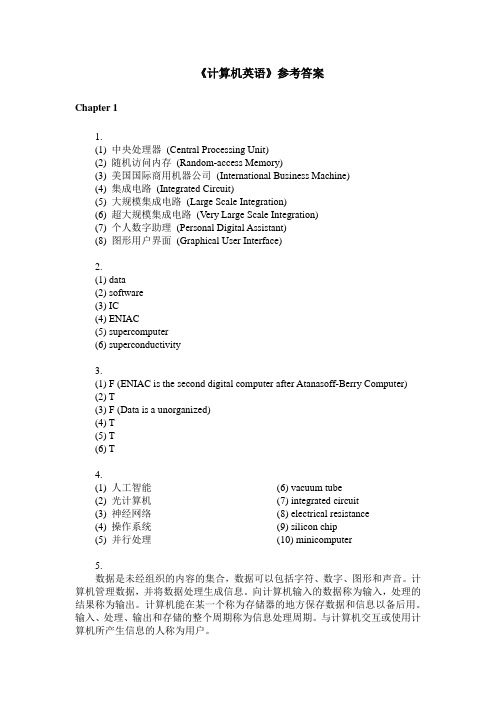
《计算机英语》参考答案Chapter 11.(1) 中央处理器(Central Processing Unit)(2) 随机访问内存(Random-access Memory)(3) 美国国际商用机器公司(International Business Machine)(4) 集成电路(Integrated Circuit)(5) 大规模集成电路(Large Scale Integration)(6) 超大规模集成电路(Very Large Scale Integration)(7) 个人数字助理(Personal Digital Assistant)(8) 图形用户界面(Graphical User Interface)2.(1) data(2) software(3) IC(4) ENIAC(5) supercomputer(6) superconductivity3.(1) F (ENIAC is the second digital computer after Atanasoff-Berry Computer)(2) T(3) F (Data is a unorganized)(4) T(5) T(6) T4.(1) 人工智能(2) 光计算机(3) 神经网络(4) 操作系统(5) 并行处理(6) vacuum tube(7) integrated circuit(8) electrical resistance(9) silicon chip(10) minicomputer5.数据是未经组织的内容的集合,数据可以包括字符、数字、图形和声音。
计算机管理数据,并将数据处理生成信息。
向计算机输入的数据称为输入,处理的结果称为输出。
计算机能在某一个称为存储器的地方保存数据和信息以备后用。
输入、处理、输出和存储的整个周期称为信息处理周期。
与计算机交互或使用计算机所产生信息的人称为用户。
1.(1) 发光二极管(Light-Emitting Diode)(2) 静态随机存储器(Static Random Access Memory)(3) 只读存储器(Read Only Memory)(4) 运算器(Arithmetic and Logical Unit)(5) 阴极射线管(Cathode Ray Tube)(6) 视频显示单元(Visual Display Unit)(7) 可编程只读存储器(Programmable Read Only Memory)(8) 液晶显示屏(Liquid Crystal Display)2.(1) CPU(2) peripheral(3) memory(4) modem(5) control unit(6) byte3.(1) T(2) T(3) F (RAM is volatile memory because the information within the computer chips is erased as soon as the computer is powered off whereas ROM is nonvolatile)(4) T(5) T(6) F (Microphones and digital cameras are input devices)4.(1) 寄存器组(2) 主机(3) 二进制的(4) 算法(5) 光盘(6) CD-RW(7) logic operation(8) barcode(9) peripheral device(10) volatile memory5.计算机的内存可被视为一系列的单元,可以在单元中存取数字。
人教版高中英语选修《计算机英语》全册课件【精品】

Homework
February 14th,1964
a desktop computer a laptop computer
A world of computers
Computers are the main means of communication. Employees use computers to deal with jobs.
Input Devices Output Devices System Unit Storage Devices Communications Devices
Answer the questions
1.What is an input device? It is any hardware component that allows you to enter data or instruction into a computer. 2.What is an output device? It is any hardware component that conveys information to one or more people. 3.What are the two components on the motherboard? The processor and the memory.
人教版高中选修 英语
全册优质课件
Introduction to Computers
Discussion
1.Do you play computer games? 2.What other things do you do with computers? 3.How much do you know about computers? 4.Do you know the first computer in the world?
人教版高中英语选修计算机英语Stand-aloneUtilityPrograms

3. Operating System Functions
Starting a computer Providing a User Interface Managing programs Managing Memory Configuring Devices Establishing an Internet Connection Providing File Management and Other Utilities
Disk Defragmenter
A disk defragmenter is a utility that reorganizes the files and unused space on a computer’s hard disk so that the operating system accesses data more quickly and programs run faster.
1. System software
System software
Operating systems
Utility programs
2. Operating Systems
An operating system is a set of programs with instructions that manage all the activities among computer hardware resources.
Explain features common to most operating systems.
Differentiate between stand-alone operating systems and network
人教版高中英语选修计算机英语TheWorldWideWebppt课件

Other Internet Services
➢What is instant messaging (IM)?
l A real-time Internet communications service that notifies you when one or more people are online and allows you to exchange messages or files
The World Wide Web
➢What graphics formats are used on the Web?
BMP
GIF
JPEG
PNG
TIFF
The World Wide Web
➢What is animation?
Appearance of motion created by displaying a series of still images in sequence
links millions of business, government agencies, schools, and individuals.
The World Wide Web
History of the Internet
➢How did the Internet originate?
How the Internet works
➢What are ways to access the Internet?
1.ISP, Regional or National 2.OSP (AOL and MSN, for example) 3.Wireless Internet
Service Provider
计算机英语原词

basic application 基本应用软件 1
chassis 机箱、机座,主板 1
communication device 通讯设备 1
compact disc CD 光盘 1
computer competency 计算机应用能力 1
label 标签 3
master slide 主控文档 3
menu 菜单 3
menu bar 菜单条 3
mumeric entry 数字输入 3
numbered list 有序列表 3
numeric entry 数字输入 3
object embedding 对象嵌入 3
basic application 基本应用程序 3
bulleted list 无序列表 3
business suite 商业套件 3
button 按扭 3
cell 单元格 3
character effect 字符效果 3
chart 图表 3
column 列 3
computer trainer 计算机培训师 3
online banking 网络银行 2
online shopping 网购 2
online stock trading 网上股票交易 2
package 程序包,组(插)件,(封装) 2
person-to-persion auction site 个人对个人的拍卖网站 2
plug-in 插件 2
address 地址 2
Advanced Research Project Agency Network ARPA 计算机网 2
人教版高中英语选修计算机英语课件 CHAPTER 1 Introduction to Computers 9. Chapter Summary课件

Discuss the uses of the Internet and World Wide Web
OBJECTIVES OVERVIEW
Distinguish between system software and application software Differentiate among types, sizes, and functions of computers in each category Describe the role of each element in an information system
Explain how home users, small office/home office users, mobile users, power users, and enterprise users each interact with computers
Discuss how society uses computers in education, finance, government, health care, science, publishing, travel, and manufacturing
EXAMPLES OF COMPUTER USAGE
Home User
• Personal financial management • Web access • Communications • Entertainment
Small Office/Home Office User
• Look up information • Send and receive e-mail messages • Make telephone calls
人教版高中英语选修计算机英语Stand-aloneOperatingSystems

Disk Defragmenter
A disk defragmenter is a utility that reorganizes the files and unused space on a computer’s hard disk so that the operating system accesses data more quickly and programs run faster.
unauthorized access Compressing files Maintaining a personal
computer
Summary
Know the two types of system software.
Explain the startup process for a personal computer.
8. Embedded Operating Systems
Examples
Windows CE. NET Pocket PC 2002 Palm OS Symbian OS
9. Stand-alone Utility Programs
Functions
Protecting against viruses Protecting a computer from
4. Operating System Utility Programs
Functions
managing files
scanning disks
defragmenting disks
diagnosing problems
File Manager
A file manager is a utility that performs functions that are related to file management. Many utilities in Windows XP can be accessed through the Accessories and System Tools submenus.
CHAPTER 8-9. Stand-alone Utility Programs课件-优质公开课-人教高中选修计算机英语精品
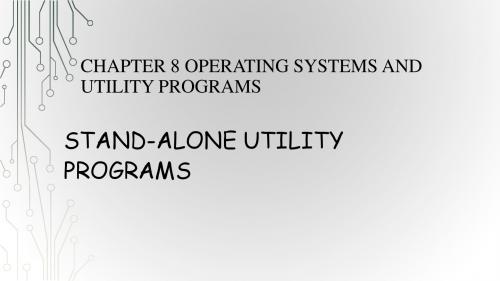
• the 2007 edition includes a number of features including on access file sharing,
inbound and outbound firewall protection, and daily definition updates.
a single computer at any given time
• it’s sometimes necessary to temporarily disable virus protection
when installing major updates
THE BEST DEFENSE
• this years best defense against mputer viruses, spyware, hackers and spam is an
antivirus program called BitDefender.
• has a user-friendly interface that scans all existing files on your computer, all
WHY IS SOFTWARE AN ISSUE?
• some antivirus software can considerably reduce performance • there should not be more than one antivirus software installed on
• also includes 24/7 support including upgrade alerts.
KASPERSKI
• for the average home user and advanced users the Kasperski antivirus software has
人教版高中英语选修:计算机英语全册课件

data or instruction into a computer.
2.What is an output device? It is any hardware component that conveys information to one or more people. 3.What are the two components on the motherboard? The processor and the memory.
Have a check
翻译词组
storage media digital divide 存储介质________________ 数字鸿沟______________ input device 系统单元________________ system unit 输入设备______________ operating system output device 操作系统________________ 输出设备______________
to prepare teaching to finish homework
People also spend much free time on the computer.
What is a computer?
A computer is an electric device, operating under the control of instructions stored in its memory that can accept data, manipulate the data according to certain rules, produce results, and store the results for future use.
人教版高中英语选修-计算机英语:Operating Systems_课件1

Disk Scanner
A disk scanner is a utility that finds and corrects both physical and logical problems on a hard disk or floppy disk and looks for and deletes unnecessary files.
4. Operating System Utility Programs
Functions
managing files
scanning disks
defragmenting disks
diagnosing problems
File Manager
A file manager is a utility that performs functions that are related to file management. Many utilities in Windows XP can be accessed through the Accessories and System Tools submenus.
5. Types of Operating Systems
stand-alone
Operating systems
network
embedded
6. Stand-alone Operating Systems
• works on a desktop computer, notebook computer, or mobile
8. Embedded Operating Systems
Examples
Windows CE. NET Pocket PC 2002 Palm OS Symbian OS
高中英语Unit 3 Computers课件1 新课标 人教版 必修2
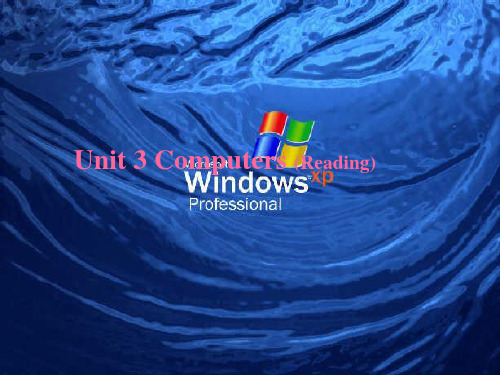
5._s_im__p_l_e_-_m_ inded unable to understand difficult things
6.___g_o__b_y__
pass
7.___d__e_a_l_w_ith t_e_tw__o_r_k broadcast on several different channels
The history of computers
The first generation (1945-1956)
the second generation (1956-1963)
the fourth generation (1971- )
the third generation (1964-1971)
3.However, people thought I was simple-minded until they discovered I had “artificial intelligence”.
Task 2: From the reading passage, find the words and expre
9 .___t_r_u_e_ly__
indeed
10._a_n_y__w_a_y___ used to show that something
happens in spite of a problem
Task 3 Look at the timeline below. Fill in the blanks with Information form the reading above. 1642: _T__h_e__c_o_m__p_u__te_r__b_e_g_a__n_a__s_a__c_a_l_c_u_l_a_t_in__g_m_ achine.
新人教版高中英语选修一Unit3单词表 (打印版)
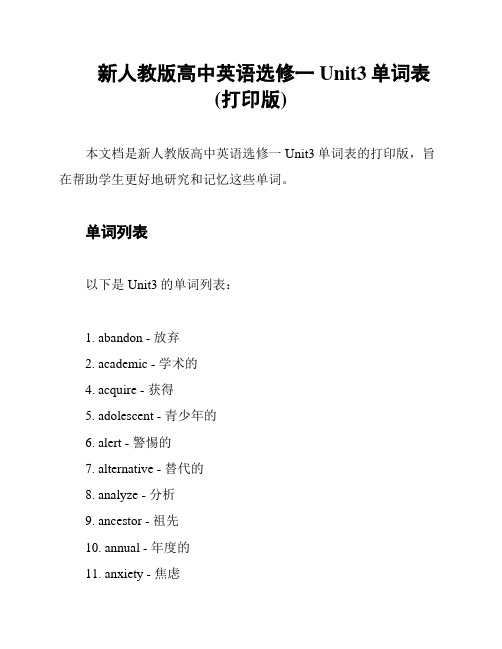
新人教版高中英语选修一Unit3单词表(打印版)本文档是新人教版高中英语选修一Unit3单词表的打印版,旨在帮助学生更好地研究和记忆这些单词。
单词列表以下是Unit3的单词列表:1. abandon - 放弃2. academic - 学术的4. acquire - 获得5. adolescent - 青少年的6. alert - 警惕的7. alternative - 替代的8. analyze - 分析9. ancestor - 祖先10. annual - 年度的11. anxiety - 焦虑12. application - 应用13. appreciate - 欣赏14. artificial - 人工的15. assistance - 帮助16. assume - 假设17. attain - 达到18. awe - 敬畏19. background - 背景20. barrier - 障碍......(此处省略)使用说明打印版的单词表可以按照以下步骤使用:1. 打印文档:使用打印机打印本文档。
2. 剪切纸张:将打印出来的文档剪切成合适的大小,以便于携带和阅读。
3. 复单词:在空闲时间里,浏览这个单词表,并尝试回忆、默写每个单词的含义和拼写。
注意事项- 本单词表仅为参考资料,不能代替教材和老师的讲解。
请结合教材和课堂内容进行研究。
- 建议学生在研究单词的同时,也要注重语境和句子的应用,以提高语言能力。
- 个别单词的含义和用法可能会根据具体语境有所变化,请以教材和老师的解释为准。
祝研究进步!参考资料- 《新人教版高中英语选修一》课本及教材。
人教版高中英语选修-计算机英语:Ports and Connectors_课件1

Processor
What is central processing unit?
Interprets and carries out the basic institutions that operate a computer.
• Control unit directs and coordinates operation in the computer.
Power supply
power supply : changes the wall outlet AC power into DC power.
fan : keeps components of the system unit cool
Putting it all together
• What it is important when you buy a computer?
Abbreviation
Size
KB or K
1024 bytes
MB
1 million
GB
1 billion
Memory
When computer’s power is turned
off
Nonvolatile memory
ROM CMOS
Volatile memory
RAM
Expansion slots and adapter cards
Summary
system unit
MIDI card Video card
Soumndotchaerrdboard Modem card
Network card …
Have a try
人教版高中英语选修计算机英语ApplicationSoftware
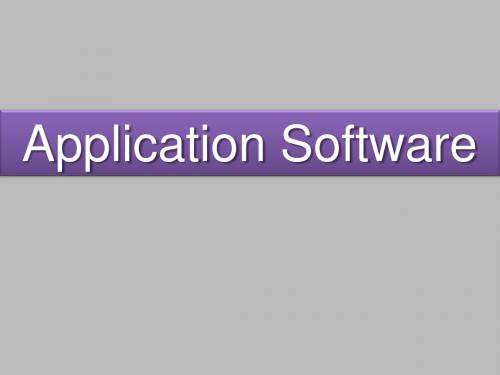
when date changes
Common application softwares
How is spreadsheet organized?
Have you ever used Microsoft Word to design a text? Can you tell us how you work with it?
Common application softwares What is spreadsheet software?
Application software
What is application software?
• Programs designed to make users more productive or assist them with personal tasks.
Can you identity it in your own words?
Facilitate communications
Application software
How is the application software distributed:
Packaged software: mass produced for many users, not one person or one company. Custom software: performs functions that are designed for a business or industry. Shareware: a copyrighted software that can be used for a short time. Freeware: a copyrighted software for free. Public-domain: not copyrighted, anyone can copy or give public-domain.
人教版高中英语选修计算机英语课件 CHAPTER 8-8. Embedded Operating Systems课件
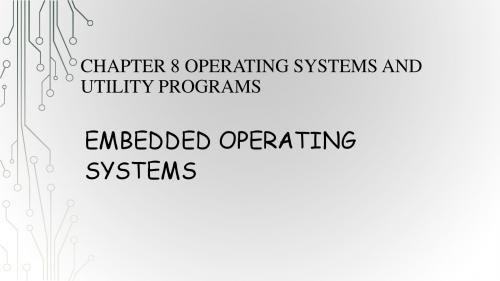
ADAPTING AN EXISTING OS
• Examples include Windows, Linux, BSD
• Generally slower than special purpose OS • Advantage is familiar interface
• Need to add
• • • • •
fast and lightweight process or thread switch Scheduling policy is real time and dispatcher module is part of scheduler Small size Responds to external interrupts quickly Minimizes intervals during which interrupts are disabled
CHAPTER 8 OPERATING SYSTEMS AND UTILITY PROGRAMS
EMBEDDED OPERATIM
• One of the most important and widely used categories of operating systems • Hardware and software designed to perform a dedicated function • Tightly coupled to their environment • Often, embedded systems are part of a larger system or product,
• E.G. antilock braking system in a car.
EXAMPLES OF EMBEDDED DEVICES
- 1、下载文档前请自行甄别文档内容的完整性,平台不提供额外的编辑、内容补充、找答案等附加服务。
- 2、"仅部分预览"的文档,不可在线预览部分如存在完整性等问题,可反馈申请退款(可完整预览的文档不适用该条件!)。
- 3、如文档侵犯您的权益,请联系客服反馈,我们会尽快为您处理(人工客服工作时间:9:00-18:30)。
4. Operating System Utility Programs
Functions
managing files
scanning disks
defragmenting disks
diagnosing problems
File Manager
A file manager is a utility that performs functions that are related to file management. Many utilities in Windows XP can be accessed through the Accessories and System Tools submenus.
操作系统就是一系列管理计算机 硬件资源之间的活动的指令的集合。
3. Operating System Functions
Starting a computer Providing a User Interface Managing programs Managing Memory Configuring Devices Establishing an Internet Connection Providing File Management and Other Utilities
Diagnostic Utility
A diagnostic utility collects information about your computer’s hardware and some system software programs and then prepares a report that lists the problems.
Disk Scanner
A disk scanner is a utility that finds and corrects both physical and logical problems on a hard disk or floppy disk and looks for and deletes unnecessary files.
Operating Systems and Utility Programs
Main contents
System Software Operating Systems Operating System Functions Operating System Utility Programs Types of Operating Systems Stand-alone Operating Systems Network Operating Systems Embedded Operating Systems Stand-alone Utility Programs
Explain features common to most operating systems.
Differentiate between stand-alone operating systems and network
operating systems.
Thank you !
5. Types of Operating Systems
stand-alone
Operating systems
network
embedded
6. Stand-alone Operating Systems
• works on a desktop computer, notebook computer, or mobile
1. System software
System software
Operating systems
Utility programs
2. Operating Systems
An operating system is a set of programs with instructions that manage all the activities among computer hardware resources.
definition computing device.
• DOS, Windows XP, Mac OSX,OS/2 Warp Client UNIX and
example Linux.
7. Network Operating Systems
Examples NetWare Windows Server 2003 OS/2 Warp Server for e-business UNIX Linux Salaris
8. Embedded Operating Syst NET Pocket PC 2002 Palm OS Symbian OS
9. Stand-alone Utility Programs
Functions
Protecting against viruses Protecting a computer from
unauthorized access Compressing files Maintaining a personal
computer
Summary
Know the two types of system software.
Explain the startup process for a personal computer.
Disk Defragmenter
A disk defragmenter is a utility that reorganizes the files and unused space on a computer’s hard disk so that the operating system accesses data more quickly and programs run faster.
